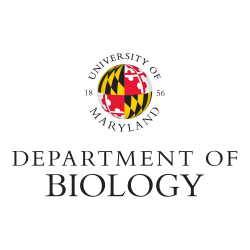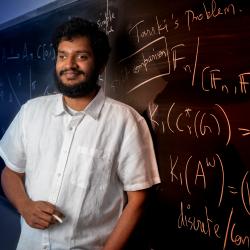Four UMD Students Named 2018 Goldwater Scholars
Four University of Maryland undergraduates have been awarded scholarships by the Barry Goldwater Scholarship and Excellence in Education Foundation, which encourages students to pursue advanced study and careers in the sciences, engineering and mathematics. In the past five years, UMD’s 20 nominations yielded 18 scholarships and two honorable mentions. Stanford University is the only institution that matched UMD's record during the same time period.
Paul Neves, Lillian Sun, Tanay Wakhare and Eric Wang were among the 211 Barry Goldwater Scholars selected from 1,280 students nominated nationally this year. Sun plans to pursue an M.D./Ph.D., while each of the other three students plans to pursue a Ph.D.
Paul Neves—a junior physics major who is also a member of the University Honors program in the Honors College and a Banneker/Key Scholar—is interested in magnetic materials, with a focus on neutron scattering and other experimental techniques that are used to study these materials.
Neves conducts research at the National Institute of Standards and Technology’s (NIST) Center for Neutron Research and the UMD Center for Nanophysics and Advanced Materials. He designed and built a new device to improve neutron scattering measurements by simultaneously measuring the bulk magnetic properties of a material under high pressure and at low temperature. The instrument will soon be available for use by all NIST scientists. Neves received a best poster award for this work in 2016 at the 9th International Workshop on Sample Environment at Scattering Facilities.
Neves also studies magnetic skyrmions—small swirling structures in magnetic materials. Specifically, he has synthesized, characterized and fine-tuned the magnetic skyrmions in the material copper selenite (Cu2OSeO3), which is being investigated for next-generation information storage. Neves submitted two journal papers and is preparing another on this work. He also received an Ovshinsky Student Travel Award honorable mention to attend the American Physical Society’s March Meeting 2018 and present his work on Cu2OSeO3.
“Paul has the instinct and raw talent to develop into a great scientist and already exhibits the motivation and maturity that are the foundation for success,” said his mentor Nicholas Butch, an adjunct assistant professor of physics at UMD and a physicist at the NIST Center for Neutron Research.
Neves is a founding member of the UMD Physics Makers club and a member of the Society of Physics Students. He also participates in outreach efforts to teach K-12 students about physics.
Lillian Sun—a junior pursuing double degrees in biological sciences and economics who is also a member of the Integrated Life Sciences program in the Honors College and a Banneker/Key Scholar—is interested in developing novel cancer vaccines.
Sun’s pursued her first research experience in high school when she interned at the National Cancer Institute’s Office of Cancer Complementary and Alternative Medicine. As part of her internship, she screened a library of herbal compounds for potential use in chemotherapy. Next, she interned at the National Institute on Deafness and Other Communication Disorders (NIDCD) researching the effectiveness of certain antibodies for immunotherapy—treatments that stimulate a patient's immune system—to treat head and neck cancers.
After joining another NIDCD lab in December 2016, Sun improved the effectiveness of a cancer immunotherapy in vitro by first treating cancer cells with chemotherapy drugs. Because chemotherapy usually kills immune cells along with cancer cells, making immunotherapy treatments less effective, this finding surprised Sun and her colleagues.
As a result of this work, Sun co-authored two papers published in the journal OncoImmunology and submitted two more papers for publication, including a first-author paper. Sun and her collaborators are currently investigating the mechanism behind this unexpected effect.
“Lily possesses a remarkable ability to grasp complex biologic processes and critically think through experimental designs to answer hypothesis-based questions that guide a scientific story,” said her mentor Clint Allen, head of the NIDCD’s Translational Tumor Immunology Program and an assistant professor in the Department of Otolaryngology-Head and Neck Surgery at the Johns Hopkins School of Medicine.
Sun founded Terps for New Horizons, a club dedicated to helping immigrants and refugees. She also participates in service projects as a member of the UMD chapter of the American Medical Student Association.
Tanay Wakhare—a sophomore pursuing double degrees in mathematics and computer science who is also a member of the University Honors program in the Honors College and a Banneker/Key Scholar—is interested in combinatorics and number theory.
 Combinatorics is a branch of mathematics that focuses on counting, and number theory centers on discovering and proving interesting and unexpected relationships between numbers. Wakhare’s research in these areas led to two published papers, six papers submitted for publication and three papers in preparation.
Combinatorics is a branch of mathematics that focuses on counting, and number theory centers on discovering and proving interesting and unexpected relationships between numbers. Wakhare’s research in these areas led to two published papers, six papers submitted for publication and three papers in preparation.
While in high school, Wakhare worked in the Applied and Computational Mathematics Division at NIST. When he traveled to Florida to attend the 2016 International Number Theory Conference, he met Christophe Vignat, a professor of physics at the Universite Paris-Saclay and an invited professor of mathematics at Tulane University. Since meeting, Vignat and Wakhare have collaborated on several combinatorics papers.
“Tanay is an exceptionally talented young mathematician—by far the best student I have ever met in my career,” Vignat said. “He has a very promising future in mathematics.”
Last summer, Wakhare built on his computer science skills in data analysis and large-scale computations by interning at the National Institute for Mathematical and Biological Synthesis in Tennessee. There, he modeled disease transmission in multi-host systems, focusing on the impact of seasonal demographic patterns of wildlife populations on infectious disease dynamics.
Back on campus, Wakhare co-taught a one-credit course he designed on “The Mathematics of Ramanujan” for the past two semesters. Teaching the course increased Wakhare’s understanding of modern multiplicative and additive number theory and developed his love of teaching.
Wakhare is a member of the Taiwanese American Student Association, the Quantitative Finance Society and the Academic Quiz Team. He also received the Dan Shanks Award from the UMD Department of Mathematics, which is awarded to an undergraduate studying computational number theory.
Eric Wang—a junior bioengineering major who is a member of the University Honors program in the Honors College and a recipient of a 2017 Howard Hughes Medical Institute Research Fellowship, a President’s Scholarship and an A. James Clark Scholarship—is interested in molecular dynamics, a computer simulation method for studying the physical movements of biomolecules.
In 2016, he began working with Jeffery Klauda, an associate professor in the Department of Chemical and Biomolecular Engineering at UMD. Wang ran molecular dynamics simulations and analyzed trajectories for computational models of lipid rafts, ocular lens membranes and the outer layer of the skin.
“I have been impressed with Eric’s computational ability to quickly learn our techniques and to know when to ask versus figuring it out on his own,” said Klauda. “He is currently at the level I might expect from a top mid-level graduate student, not an undergraduate that has only worked in my lab for a year.”
Wang published three first-author papers and one co-first author paper. Currently, he is preparing another manuscript for submission. He presented his work at the 254th American Chemical Society (ACS) National Meeting last summer and the 62nd Meeting of the Biophysical Society this past winter. At the ACS meeting, he won the Jeffry Madura Outstanding Research Award for his poster presentation.
Last summer, Wang joined the lab of Klauda’s collaborator, Richard Pastor, a senior investigator in the Membrane Biophysics Section of the National Heart, Lung, and Blood Institute at the National Institutes of Health. There, he used molecular dynamics to determine how a peptide that promotes membrane fusion stabilizes pore formation.
Wang is a member of Catholic Terps and Knights of Columbus. He also enjoys being a teaching assistant for engineering courses, mentoring a local high school student in bioengineering research and tutoring students at K-12 schools near campus.
The Goldwater Scholarship program was created in 1986 to identify students of outstanding ability and promise in science, engineering and mathematics, and to encourage their pursuit of advanced study and research careers. The Goldwater Foundation has honored 62 University of Maryland winners and five honorable mentions since the program’s first award was given in 1989.
Colleges and universities may submit up to four nominations annually for these awards. Goldwater Scholars receive one- or two-year scholarships that cover the cost of tuition, fees, books, and room and board up to $7,500 per year. These scholarships are a stepping-stone to future support for the students’ research careers.
Media Relations Contact: Abby Robinson, 301-405-5845, abbyr@umd.edu
University of Maryland
College of Computer, Mathematical, and Natural Sciences
2300 Symons Hall
College Park, MD 20742
www.cmns.umd.edu
@UMDscience
About the College of Computer, Mathematical, and Natural Sciences
The College of Computer, Mathematical, and Natural Sciences at the University of Maryland educates more than 9,000 future scientific leaders in its undergraduate and graduate programs each year. The college’s 10 departments and more than a dozen interdisciplinary research centers foster scientific discovery with annual sponsored research funding exceeding $175 million.









